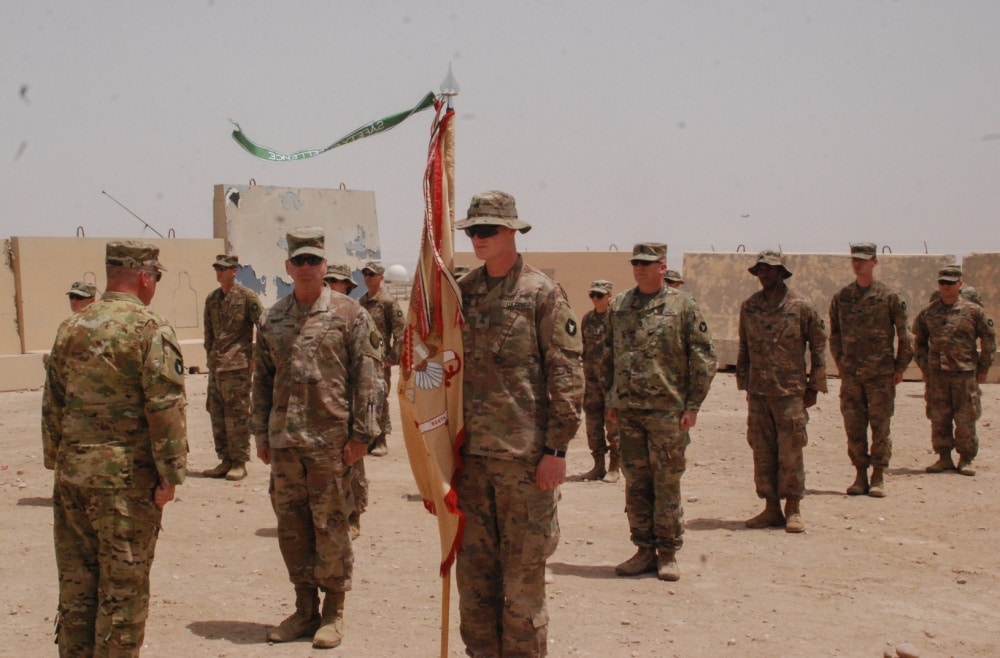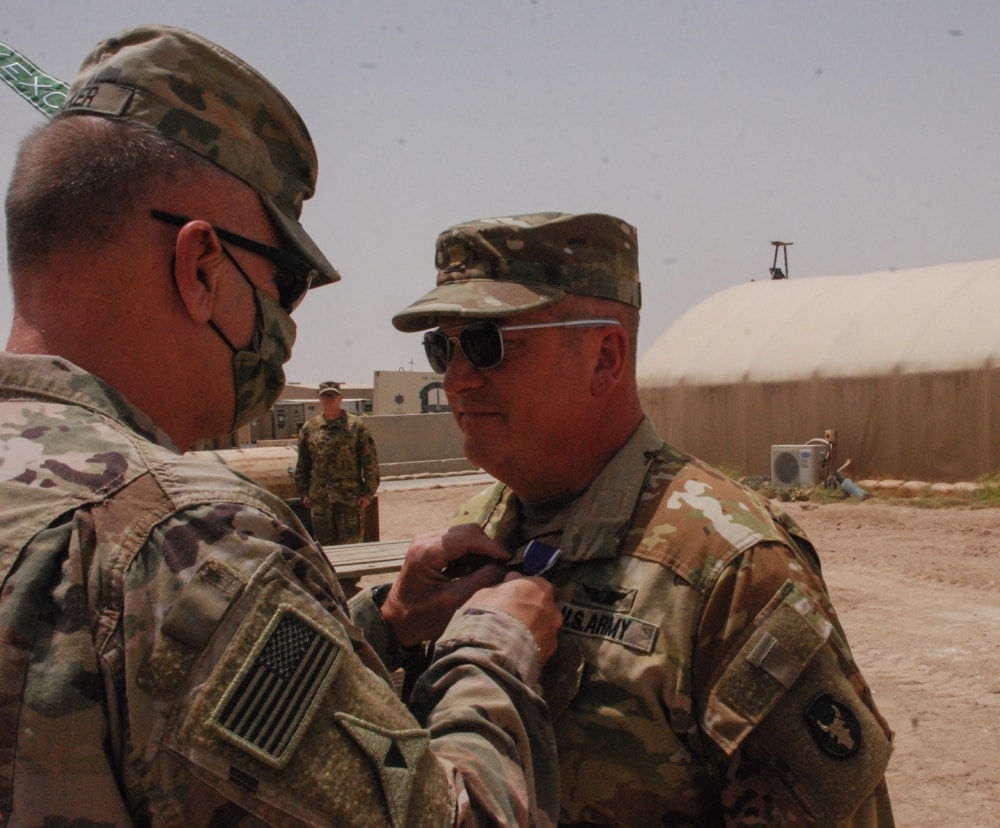The Pentagon has approved Purple Heart commendations for 29 U.S. Army soldiers who suffered traumatic brain injuries (TBI) as a result of a Jan. 8 missile attack by Iran on the Al Asad Air Base in Iraq.
Some of the Purple Heart recipients have already been presented with the award for the injuries they sustained as a result of Iranian missile strikes against the U.S. airbase in Iraq. In total, 80 Purple Heart recommendation packages were submitted for review, CBS News reported.
The U.S. military shared photos on Sunday of some of the first Purple Heart presentations.

Members of the Headquarters Support Company, 834th Aviation Support Battalion stand in formation (maintaining physical distancing standards for COVID-19 prevention) on May 2, 2020, at Camp Buehring, Kuwait, during the Purple Heart presentation ceremony for Maj. Alan Johnson. (U.S. Army photo by Sgt. Morgan Maidl)
The remaining soldiers approved for the Purple Heart are expected to receive their awards this week.
Combined Joint Task Force-Operation Inherent Resolve (CJTF-OIR) Lt. Gen. Pat White reviewed the 80 requests but ultimately recommended against 51 of them, including from two U.S. Air Force airmen. The Purple Heart requests were submitted by individual units and evaluated in line with U.S. Army and Air Force regulations.

1st Lt. Abigail Holstein salutes Col. Greg Fix, brigade commander for the 34th Expeditionary Combat Aviation Brigade, after being presented with the Purple Heart medal for her injuries sustained during the theater ballistic missile attacks at Al Asad Air Base, Iraq, on January 8, 2020. To the left and right of her stands Command Sgt. Maj. Todd Sudheimer and Lt. Col. Kyle Liudahl, her battalion command team with 2-147th Assault Helicopter Battalion. (U.S. Army photo by Sgt. Sydney Mariette)
“It is important to note that a traumatic brain injury diagnosis does not automatically qualify a service member for Purple Heart eligibility or awarding, and the CJTF-OIR process was designed to be a fair and impartial proceeding that evaluated each case in accordance with applicable regulations,” CENTCOM spokesman Cmdr. Zachary Harrell said in a statement provided to Air Force Magazine.

Maj. Alan Johnson is pinned with the Purple Heart medal by Combined Joint Task Force – Operation Inherent Resolve Director of Sustainment, Brig. Gen. Vincent Barker, on May 2, 2020, for his injuries sustained during the theater ballistic missile attacks at Al Asad Air Base, Iraq, on January 8, 2020. Maj. Johnson serves as an Aeromedical Physician’s Assistant with Headquarters Support Company, 834th Aviation Support Battalion and is from Duluth, Minnesota. (U.S. Army photo by Sgt. Morgan Maidl)
The U.S. Air Force guidelines established “moderate or penetrating” TBI’s with the loss of consciousness as the threshold for a Purple Heart commendation.
The Jan. 8 Iranian missile attack came as a retaliatory measure after a U.S. airstrike that killed Iranian Quds Force Gen. Qassem Soleimani. The Iranian general was in Baghdad, Iraq amid pro-Iranian attacks on the U.S. Embassy in Baghdad. Iranian forces fired missiles at both the Al Asad Air Base and another position housing U.S. troops in Irbil, Iraq.
President Donald Trump initially assessed that there were no injuries as a result of the missile strikes. In the days and weeks that followed, however, U.S. troops began reporting concussion-like symptoms and by late February, 110 U.S. troops had been diagnosed with TBI.
Trump drew criticism for initially dismissing the head injuries as “not serious.” In a January Pentagon press conference, Joint Chiefs Chairman Gen. Mark Milley said Trump’s characterization of the injuries likely stemmed from the Pentagon’s method for describing injuries, with TBI cases classified as Not Serious Injured (NSI) incidents. Trump has since stuck by his characterization of the injuries.
Tensions between the U.S. and Iran appeared to subside after the January missile attack, however the U.S. did launch retaliatory strikes against pro-Iranian militias in Iraq in March and in April Trump tweeted to warn Iran against a “sneak attack.”
“Upon information and belief, Iran or its proxies are planning a sneak attack on U.S. troops and/or assets in Iraq,” Trump tweeted. “If this happens, Iran will pay a very heavy price, indeed!”
Upon information and belief, Iran or its proxies are planning a sneak attack on U.S. troops and/or assets in Iraq. If this happens, Iran will pay a very heavy price, indeed!
— Donald J. Trump (@realDonaldTrump) April 1, 2020



